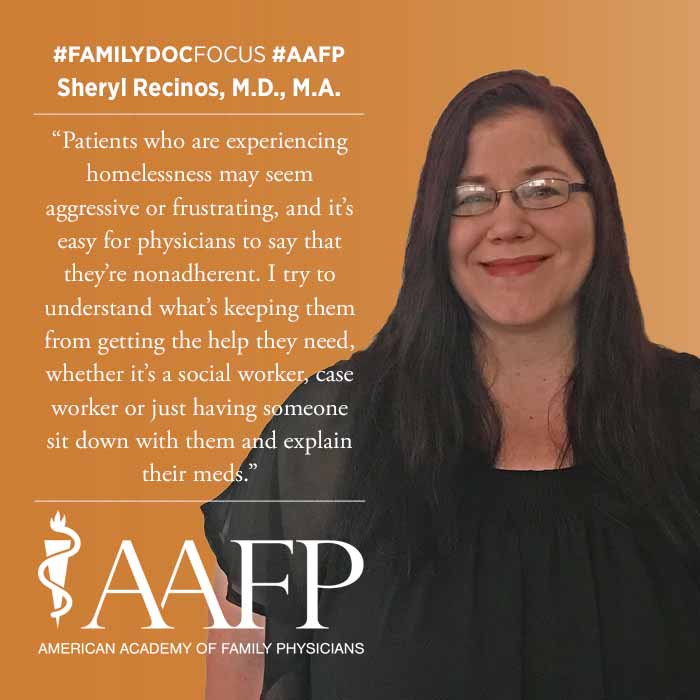From Homeless Teen to Family Doc
August 05, 2019 12:18 pm David Mitchell – Sheryl Recinos, M.D., M.A., understands the challenges of patients experiencing homelessness in a way few physicians can. She survived for three years on her own, in the shelters and on the streets of Los Angeles as a teenager.
"I find a way to work through the barriers that are keeping them from getting care," said Recinos, now a hospitalist in Santa Clarita, Calif. "Patients who are experiencing homelessness may seem aggressive or frustrating, and it's easy for physicians to say that they're nonadherent. I try to understand what's keeping them from getting the help they need, whether it's a social worker, case worker or just having someone sit down with them and explain their meds."
For example, Recinos had a patient who was repeatedly hospitalized because of complications related to uncontrolled diabetes. Recinos made the woman a chart that helped her understand when she needed to check her glucose.
"That's all it took," Recinos said. "She was completely controlled after so many hospitalizations because I was able to find a way to connect with her."
Recinos' career path has been unusual. She graduated from an alternative high school while homeless, got a job and an apartment, and started college. Her stay was short-lived. Pregnant at 19, she dropped out and went to a Hollywood shelter.

A financial aid program for single moms helped her get out of the shelter and back in school. She made it through community college and later earned a sociology degree at the University of California, Los Angeles. At California State University-Northridge, she added a biology degree and a master's in education.
"I taught high school biology and chemistry for eight years while I tried to figure out what to do to keep my dream of becoming a doctor alive," Recinos said. "It wasn't where my heart was, so I took night school classes, volunteered and did research until I was finally accepted to med school at 31."
At that point, Recinos was married with three kids. The school that accepted her was Ross University School of Medicine, which was then located on the Caribbean island of Dominica (it relocated to Barbados this year because of damage caused by Hurricane Maria in 2017).
Ross contracts with hospitals throughout the United States to place students in clinical rotations, meaning Recinos spent two years in Dominica and two years moving between hospitals in New York and Florida.
"It was hard to move to another country and give up our stability because I had that early life experience," she said. "I felt unstable going from rotation to rotation. I felt very unsettled."
Recinos moved back to California to complete her training at Riverside County Regional Medical Center (now Riverside University Health System), and she now works part time at one hospital and works locums shifts at another.
Recinos knows she was fortunate to make it this far. More than one-third of children experiencing homelessness don't graduate from high school. According to a 2018 survey, 9% of U.S. college students are homeless.
Last year, Recinos set up a scholarship program through My Friend's Place, the Los Angeles shelter that helped her as a teen, for college students who have experienced homelessness.
"That was a goal of mine, to go back and set up a scholarship fund for kids like me who didn't have parents to call when things go bad," she said. "They helped change my life and gave me the help I needed instead of judging the bad choices I was making."
Recinos, who will participate in a panel discussion about caring for the underserved Sept. 7 during the California AFP's Student and Family Medicine Resident Summit, has written Hindsight: Coming of age on the streets of Hollywood, a memoir about her trek from homeless teen to family physician. She said she hopes it will help others better understand homelessness.
"A lot of people have told me that it changed the way they view patients who are homeless," she said. "They're starting to listen more and ask more questions. I also hope physicians who have had their own challenges will find students and residents to mentor and help them get through theirs."